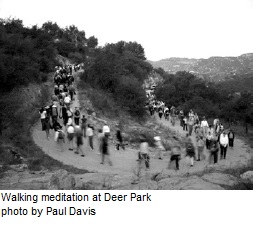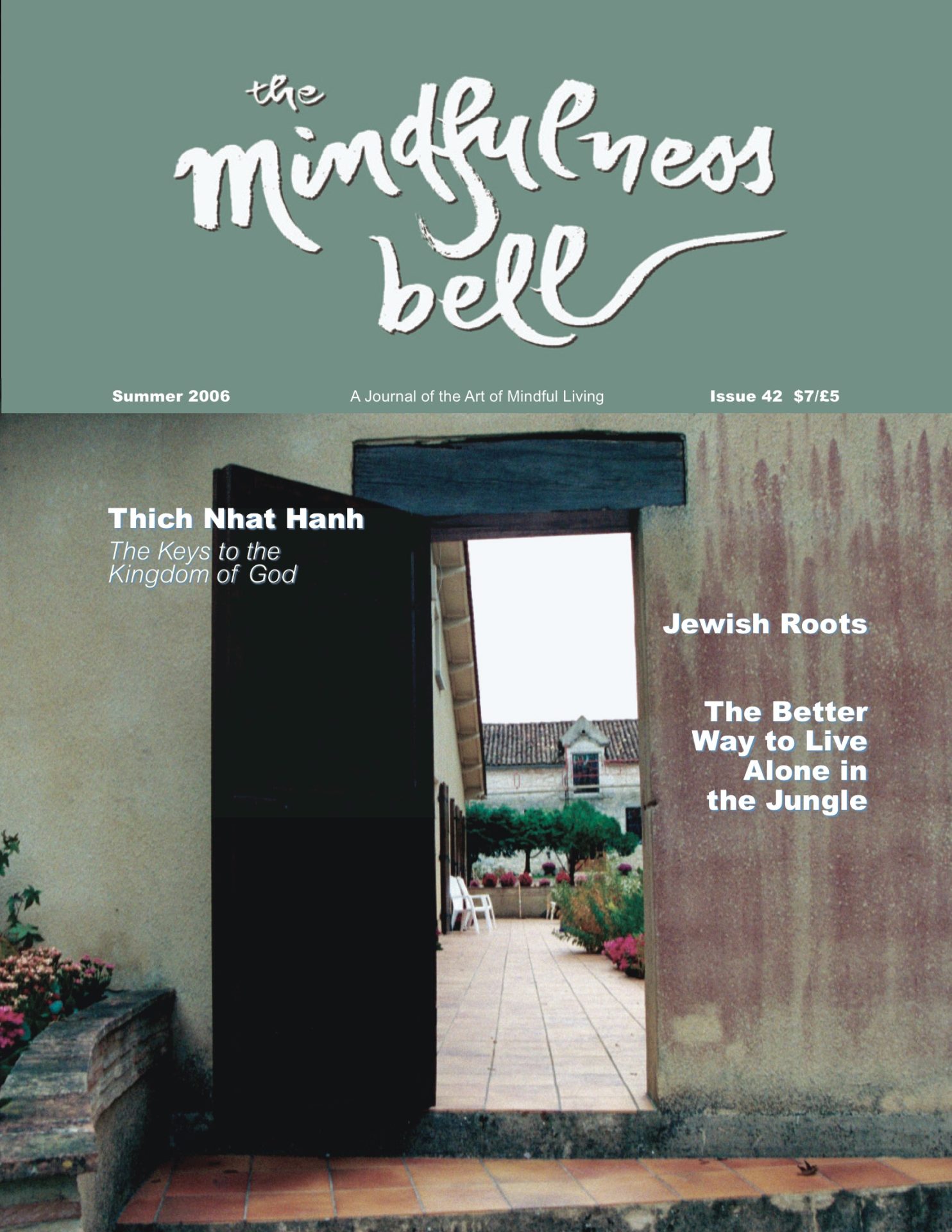A Retreat with Thich Nhat Hanh
By Jill Siler

The Vietnamese monk seemed to float onto the stage. He put his palms together and bowed his head. Then smiling, he folded his legs, effortlessly sank to the floor, and settled on a small round cushion.
“Dear friends,” said Thich Nhat Hanh, “this moment heals all moments.” I didn’t understand that at all,
A Retreat with Thich Nhat Hanh
By Jill Siler

The Vietnamese monk seemed to float onto the stage. He put his palms together and bowed his head. Then smiling, he folded his legs, effortlessly sank to the floor, and settled on a small round cushion.
“Dear friends,” said Thich Nhat Hanh, “this moment heals all moments.” I didn’t understand that at all, but I loved listening to the gentle, earnest way in which he spoke. The dharma talks, or teachings, were being given in a huge tent where hundreds of people sat on the floor in front of him; some sat on little cushions called zafus, some sat wrapped in blankets, and some sat on chairs further towards the back. We’d gathered here for a five-day, silent retreat to study with this world-renowned Zen teacher.
“The Buddha often taught about the importance of slowing down,” he continued in his beautifully accented voice, “of stopping all thoughts so that we might enjoy present moment awareness.”
Whatever. I have things to do and places to go. I have a staggering list of things that must get accomplished for me to even keep afloat, let alone make progress.
“This wonderful present moment,” he said again, smiling like he was really happy about it.
Present moment, my foot. That’s not going to solve my problems.
My husband was pouring our retirement savings into his boat and in denial about it. I was taking radioactive medication and my hair was falling out. I felt like throwing up all the time, my knees hurt, and my teenage daughters were careening through the hellrealm years of their adolescence. These were the elements creating my present moment.
But then he said that by practicing this simple idea, this sutra—and a sutra is a sacred teaching—suffering could be relieved and we could experience a greater capacity for joy. Well, I’m all for less suffering and greater joy, so my interest was sparked. He said that it takes practice to bring ourselves into the here and now, but that we should try it when we find that anguish or discomfort has risen in us. He said if we become mindful of our thinking and look deeply at the nature of what caused our personal sorrow we can begin to heal or unravel it.
Whatever. I could not unravel ill health or my husband’s boat.
Thich Nhat Hanh put his palms together and closed his eyes. He took a breath: slow, slow, in and out, and the room got quiet as a night sky. He asked us again to remember this simple teaching, from the “Discourse on Knowing the Better Way to Live Alone”: Do not pursue the past, for the past no longer is. Do not chase the future, for the future is yet to come. By looking deeply at life as it is in the here and now, happiness is attainable.
Well that was it. I had personally hoped for something with a little more kick to it.
At the end of his two-hour talk, he asked us to take our cushions and blankets back to our rooms because it might rain and the tent leaked. I really liked where my zafu was placed. I was very close to Thay and knew chances were slim that I’d get this close tomorrow. The retreat was being held on the side of a mountain in Vermont and it seemed senseless to drag my cushion back down the mountain and haul it up again in the morning. I peeked out at the cloudless evening sky and decided to just push my cushion against the tent pole behind me and leave it there. When almost everyone was gone, I furtively arranged my cushion and slipped out of the tent.
People were scattered over the mountain, moving with mindful attention; walking with slow deliberate steps. The whole scene was so reminiscent of Night of the Living Dead that it struck me as ridiculous. I felt no reverence for any of it and I thought I might leave early.

Giving It a Try
That night, back in my room, it was time for me to take more medicine. I dreaded it because I knew it kept me feeling sick. As I stood at the sink, filling my glass with water, I began to notice that I felt really uncomfortable. This is what happens to me when there’s no TV, no one talking, and no distractions. I become more aware of what’s going on inside. I considered what Thay had said about looking deeply at our suffering instead of running away from it. The discomfort, I found, was fear. I got so sad, that I believed I could feel my heart aching. I was really scared the medicine wouldn’t work and I might die. I wanted to see my daughters find happiness. I wanted to be an old woman. I didn’t want to say goodbye to my friends or be brave. I wanted to be alive and figure it all out.
This is suffering, I decided, so maybe I should try that present moment thing.
I considered the sutra; look at life as it is in the here and now. Don’t chase the future.
I took a breath and tried.
The present moment sucks, I thought. I’m really depressed. I took another breath and tried again.
In this moment, I discovered, I’m okay. Actually, I’m good. I’m not nauseous. I’m not dead. I’m okay. Actually, as I thought about it some more, just right now in this moment, I’m getting well. I’m good.
It worked! This little monk might be onto something. Reality was still reality, but the suffering part, the mental anguish had passed. Very cool, I decided. Maybe I’ll stay.
All Is Lost
Two o’clock in the morning: thunder is cracking over the mountains so loudly that the window shakes. The rain pours down with such shocking intensity that as I stand by my window weeping, I can’t see five inches into the lightning-illumined night.
All is lost.
The retreat is ruined for me. My blanket and my zafu are in the tent getting soaked. What is wrong with me? Why am I such a mess? I came a thousand miles to listen to this guy and when he tells me to take my cushion, I think I know better. It’s too cold to sit in the tent with no blanket and I don’t want to sit with the tourists on chairs in the back. I hate myself. I hate this retreat. I want my zafu and blanket dry: I want to do this night over.
I get back in my bed and listen to the rain pound against the roof. I kick the blankets, moan, and blow my nose. I roll over, kick the blankets, and roll over again. I think of Thay’s words… life as it is in the here and now. Right now my zafu and blankets are getting soaked, I wail to myself, the soul of misery. Tomorrow will be ruined and the next day. I bet it takes a month to dry out a zafu.
Practice not chasing the future, I remind myself. I take a breath and try again.
In this exact moment, I am here in this bed; nothing hurts. I am not hot or cold or dirty or hungry. Though the heavens are crashing over me and rain is pouring down on everything, I am dry and warm and safely inside. Tomorrow will bring what tomorrow will bring. Right now there is absolutely nothing I can do about that.
I did this for a while and began noticing that I felt downright cozy. I slept peacefully till the br-r-ron-n-nng of the morning bell called us to meditation.
In the tent again, my zafu and blanket were waiting for me, dry and warm. I wondered how much of my life I’d spent worrying about things that wouldn’t even happen. I wondered how many times I’d traded a moment of peace for a moment of suffering.
Vacuum Meditation
A few months later, I was vacuuming my house. A huge mirror hangs on one of the walls. As I worked, I whined and grumbled to no one. “Geez! Look at this. Gross! Stupid dog. Why do I even bother? Sheez!” I was bent over, sucking up some dog hair, and I happened to glance at myself in the mirror. I saw how I’d aged and as I looked at my face, I saw my mother looking back at me. I saw how like her I’d become, not just physically, but the same style of complaining and negativity. In that instant, I saw how I carried my mother and my grandmother’s habits into my daughters’ lives. I saw how I could change that and suddenly, I knew that in that specific moment, I was healing all moments. I was healing the past of my ancestors and the future of my daughters and granddaughters.
I turned off the vacuum cleaner and set it down.
With palms pressed together, following my breath, I touched the present moment and thanked my teacher.
Jill Siler, Calm Calling of the Heart, founded the Miami Beach Sangha after this retreat with Thay as a direct result of Thay’s request that she either find a sangha or center to practice in, or start one.

